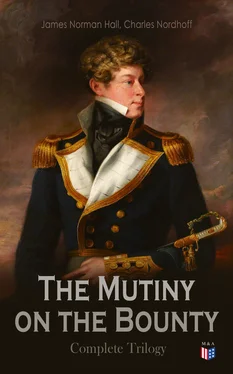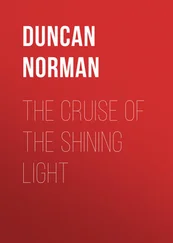“Ah, Mr. Christian, there you are!” he exclaimed as he heaved himself on deck. “What a madhouse! I’d like to sink the lot of those Jews, and heave the wenches overboard! Who’s this? The new reefer, Mr. Byam, I’ll be bound! Welcome on board, Mr. Byam; your father’s name stands high in our science, eh, Mr. Christian?”
“Mr. Fryer, the master,” said Christian in my ear.
“A madhouse,” Fryer went on. “Thank God we shall pay off to-morrow night! Wenches everywhere, above decks and below.” He turned to Christian. “Go forward and gather a boat’s crew for Lieutenant Bligh—there are a few men still sober.”
“There’s discipline on a man-of-war at sea,” he continued; “but give me a merchant ship in port. The captain’s clerk is the only sober man below. The surgeon.... Ah, here he is now!”
Turning to follow Fryer’s glance, I saw a head thatched with thick snow-white hair appearing in the ladderway. Our sawbones had a wooden leg and a long equine face, red as the wattles of a turkey cock; even the back of his neck, lined with deep wrinkles like a tortoise’s, was of the same fiery red. His twinkling bright blue eyes caught sight of the man beside me. Holding to the ladder with one hand, he waved a half-empty bottle of brandy at us.
“Ahoy there, Mr. Fryer!” he hailed jovially. “Have you seen Nelson, the botanist? I prescribed a drop of brandy for his rheumatic leg; it’s time he took his medicine.”
“He’s gone ashore.”
The surgeon shook his head with mock regret. “He’ll give his good shillings to some Portsmouth quack, I wager. Yet here on board he might enjoy free and gratis the advice of the most enlightened medical opinion. Away with all bark and physic!” He flourished his bottle. “Here is the remedy for nine tenths of human ills. Aye! Drops of brandy! That’s it!” Suddenly, in a mellow, husky voice, sweet and true, he began to sing:—
“And Johnny shall have a new bonnet
And Johnny shall go to the fair,
And Johnny shall have a blue ribbon
To tie up his bonny brown hair.”
With a final flourish of his bottle, our surgeon went hopping down the ladderway. Fryer stared after him for a moment before he followed him below. Left to myself in the midst of the uproar on deck, I looked about me curiously.
Lieutenant Bligh, an old hand in the Navy, was nowhere to be seen. On the morrow the men would receive two months’ wages in advance, and on the following day we should set sail on a voyage to the other side of the world, facing the hardships and dangers of seas still largely unexplored. The Bounty might well be gone two years or more, and now, on the eve of departure, her crew was allowed to relax for a day or two of such amusements as sailors most enjoy.
While I waited for Bligh in the uproar, I diverted myself in studying the rigging of the Bounty. Born and brought up on the west coast of England, I had loved the sea from childhood and lived amongst men who spoke of ships and their qualities as men gossip of horses elsewhere. The Bounty was ship-rigged, and to a true landsman her rigging would have seemed a veritable maze of ropes. But even in my inexperience I knew enough to name her sails, the different parts of her standing rigging, and most of the complex system of halliards, lifts, braces, sheets, and other ropes for the management of sails and yards. She spread two headsails—foretopmast-staysail and jib; on fore and main masts she carried courses, topsails, topgallants, and royals, and the mizzenmast spread the latter three sails. That American innovation, the cross jack, had not in those days been introduced. The cross jack yard was still, as the French say, a vergue sèche,—a barren yard,—and the Bounty’s driver, though loose at the foot, was of the gaff-headed type, then superseding the clumsy lateen our ships had carried on the mizzen for centuries.
As I mused on the Bounty’s sails and ropes, asking myself how this order or that would be given, and wondering how I should go about obeying were I told to furl a royal or lend a hand at one of the braces, I felt something of the spell which even the smallest ship casts over me to this day. For a ship is the noblest of all man’s works—a cunning fabric of wood, and iron, and hemp, wonderfully propelled by wings of canvas, and seeming at times to have the very breath of life. I was craning my neck to stare aloft when I heard Bligh’s voice, harsh and abrupt.
“Mr. Byam!”
I gathered my wits with a start and found Lieutenant Bligh, in full uniform, at my side. He gave a faint quizzing smile and went on: “She’s small, eh? But a taut little ship—a taut little ship!” He made me a sign to follow him over the Bounty’s side.
Our boat’s crew, if not strictly sober, were able to row, and put their backs into it with a will. We were soon alongside Captain Courtney’s tall seventy-four. The Tigress paid Mr. Bligh the compliment of piping the side. Side boys in spotless white stood at attention by the red ropes to the gangway; the boatswain, in full uniform, blew a slow and solemn salute on his silver whistle as Bligh’s foot touched the deck. Marine sentries stood at attention, and all was silent save for the mournful piping. We walked aft, saluting the quarter-deck, where Captain Courtney awaited us.
Courtney and Bligh were old acquaintances; he had been with Bligh on the Belle Poule, in the stubborn and bloody action of Dogger Bank six years before. Captain Courtney was a member of a great family—a tall, slender officer, with a quizzing glass and a thin-lipped ironic mouth. He greeted us pleasantly, spoke of my father, whom he had known more by reputation than otherwise, and led us to his cabin aft, where a red-coated sentry stood at the bulkhead, a drawn sword in his hand. It was the first time I had been in the cabin of a man-of-war, and I gazed about me curiously. Its floor was the upper gun-deck and its ceiling the poop; so the apartment seemed very lofty for a ship. The ports were glazed, and a door aft gave on the stern-walk, with its carvings and gilded rail, where the captain might take his pleasure undisturbed. But the cabin itself was furnished with Spartan bareness: a long settee under the ports, a heavy fixed table, and a few chairs. A lamp swung in gimbals overhead; there were a telescope in a bracket, a short shelf of books, and a stand of muskets and cutlasses in a rack about the mizzenmast. The table was laid for three.
“A glass of sherry with you, Mr. Bligh,” said the captain, as a man handed the glasses on a tray. He smiled at me in his courtly way, and raised his glass. “To the memory of your father, young man! We seamen owe him a lasting debt.”
As we drank, I heard a great stir and shuffling of feet on deck, and the distant sound of a drum. Captain Courtney glanced at his watch, finished his wine, and rose from the settee.
“My apologies. They’re flogging a man through the fleet, and I hear the boats coming. I must read the sentence at the gangway—a deuced bore. Make yourselves at home; should you wish to be spectators, I can recommend the poop.”
Next moment he passed the rigid marine at the bulkhead and was gone. Bligh listened for a moment to the distant drumming, set down his glass, and beckoned me to follow him. From the quarter-deck a short ladder led up to the poop, a high point of vantage from which all that went on was visible. Though the air was crisp, the wind was the merest cat’s-paw and the sun shone in a blue and cloudless sky.
The order to turn all hands aft to witness punishment was being piped by the boatswain and shouted by his mates. The marines, with muskets and side-arms, were hastening aft to fall in before us on the poop. Captain Courtney and his lieutenants stood on the weather quarter-deck, and the junior officers were gathered to leeward of them. The doctor and purser stood further to leeward, under the break of the poop, behind the boatswain and his mates. The ship’s company was gathered along the lee bulwarks—some, to see better, standing in the boats or on the booms. A tall ninety-eight and a third-rate like the Tigress lay at anchor close by, and I saw that their ports and bulwarks were crowded with silent men.
Читать дальше











